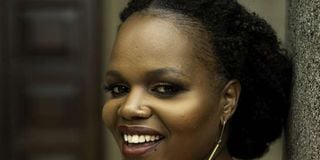T5 interview with Wanjiru Koinange

What you need to know:
- I think my book holds up a mirror to our lives at a very specific, tragic, and monumental moment in our history and attempts to display as many perspectives of that moment as possible.
- The setting for this exploration just happens to be political one, but if you removed the election and replaced it with the pandemic - the story would still hold.
1.Your book, The Havoc of Choice, took you eight years to write. What was the process like?
The process changed a lot over those eight years. It started with a lot of reading because I had so many questions about the 2007/2008 post-election violence. For the first six to eight months all I did was read everything I could find about that period. When I was done with the research, I still had questions, and that’s why I wrote the book.
I wrote every day. My status as a full-time student allowed this. I would wake up and write as if it were my job. I would sit at my desk for eight to 10 hours a day and just write. Sometimes writing was easy and when it wasn’t, I would read poetry and listen to music (lots of Beyonce, Babyface, Nina Simone, Atemi and Sauti Sol). Oh, and there were TED talks and lots of naps!
While inspiration can’t be scheduled, I think it is important to show up at your desk every day and wait! She will come when you are ready for her.
2. Do you think your book offers a different perspective on what determines our 'Kenyanness'?
It doesn’t provide any answers or new insight into how we politic or vote or how this can be done better. At the end of the book, I still had as many questions as I had in the beginning. On what defines “Kenyanness”, the jury is still out.
I think my book holds up a mirror to our lives at a very specific, tragic, and monumental moment in our history and attempts to display as many perspectives of that moment as possible. The setting for this exploration just happens to be political one, but if you removed the election and replaced it with the pandemic - the story would still hold.
3. How did you go about selling your book? What advice do you have for authors wanting to do the same?
When I finished the first draft, I got an agent. She and I worked on three drafts of the manuscript before she even started to sell it to publishers. It was two and a half years before I got a UK book deal and that came with four more drafts. During the editing period, it became clear that due to the subject matter, the work might be better represented in Kenya by a local publishing company.
Jacaranda went on to publish the book in the UK in November 2019 and back home, we set up Bunk Books and published the book in July 2020. We outsource the distribution because we are a tiny business with a tiny team and big goals.
I wish I had known how long the process is. It would have helped me manage my expectations, time, and anxieties better. I also learnt that the work doesn’t end with the first draft. Editing is where the hard work is.
4. Do you think formal education is an important requirement for writers or is it about talent?
This depends on what you are looking to get out of writing school. I decided to go to study writing because I love studying, and I had tried and failed to get time to write when I was working in the entertainment industry. I needed to free myself from all distractions and I needed someone or something to force me to finish a book.
Did school make me a better writer? No. Hours and hours of writing and editing did that. But it allowed me to be part of a community of writers, mentors and industry professionals who are as useful to me now as they were all those years ago.
5. What are you reading right now?
Girl Woman Other by Bernadine Evaristo and looking forward to starting Dance of the Monkeys by Ciku Kimeria. I am not writing creatively at the moment, but I can’t wait to get started on the next novel. I am writing lots of commissioned articles though - to keep the muscle busy.





